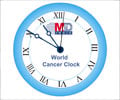In a meeting held at Chicago, leaders from world cancer organizations calls for an international effort to halt the rapid spread of cancer in poor and middle-income countries.

The officials called on President Barack Obama and other world leaders to take concrete action at a September meeting at the United Nations scheduled to focus on non-communicable diseases.
The September UN meeting "presents a monumental opportunity to put cancer on the global agenda," said Allen Lichter, the ASCO's chief executive officer.
"We urge world leaders to help save and improve the lives of millions of people living with cancer or at risk for the disease," Lichter said at a press conference.
The only previous UN meeting of this type was held in 2001 and focused on the spread of HIV/AIDS.
Lichter said that ASCO sent a letter co-signed by nearly 300,000 health care professionals to the White House on Monday asking Obama to participate in the UN meeting.
Advertisement
A UN report concluded that the cancer rate will continue and rise and reach more than 20 million annual cases in 2030. Most of these new cases are expected to occur in low and middle-income countries.
Advertisement
At the current rate, the number of cancer cases in these countries will surpass the number of cancer cases in developed countries by about 2015.
However there is a dearth of oncologists in poor and developing countries -- Ethiopia for example, population 80 million, has just one oncologist -- and those who do work there have limited access to the latest cancer treatments and early-detection tools.
The oncologists at the Chicago meeting were also trying to mobilize public attention for their their "World Cancer Declaration," which outlined 11 objectives they hope to achieve by 2020.
The goals, aimed at reducing levels of cancer, include sharp reductions in smoking, drinking alcohol, rates of obesity, and improvements in access to health care and universal vaccination programs for hepatitis B and human papillomavirus (HPV) aimed at preventing liver and uterine cancer.
The declaration has 230,000 signatures. Organizers hope they can obtain one million signatures by the time of the UN conference in September.
Source-AFP













